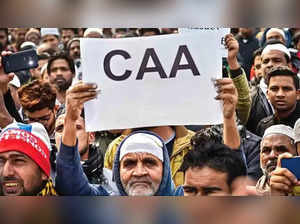

Just before the Lok Sabha polls, Ministry of Home Affairs on Monday notified the Citizenship Amendment Rules under the Citizenship Amendment Act (CAA). Based on the rules, minorities facing persecution on religious grounds in Pakistan, Bangladesh, and Afghanistan will be able to obtain Indian citizenship. Along with this, the rule will grant of citizenship to citizens of Pakistan, Bangladesh and Afghanistan belonging to Hindu, Sikh, Jain, Christian, Buddhist & Parsi communities, who had migrated to India on (or) before December 31, 2014.
The Home Ministry led by Amit Shah has launched a new portal for individuals seeking Indian citizenship under CAA.
5. Any individual who has resided in India throughout the period of 12 month simmediately before making an application for registration or been in the country during the 8 years immediately preceding the said period of 12 months for a period of not less than 6 years.
6. The individual has adequate knowledge of a language specified in the Eighth Schedule to the Constitution.
Character, language are some of the other criteria that are required for getting citizenship under the newly notified rules. The application process for citizenship by naturalization, as outlined in Form VIIIA, requires the completion of several key steps and submission of specific documentation.
What is the process of application submission?
Under section 6B of the Citizenship Act, 1955, individuals seeking registration or naturalization must follow the following process:
Submission of Application: Applications should be submitted electronically by the applicant to the Empowered Committee through the District Level Committee designated by the Central Government
Acknowledgment: Upon submission, an acknowledgment in Form IX is electronically generated.
Document Verification: Led by a Designated Officer, the District Level Committee verifies the documents submitted along with the application.
Oath of Allegiance: The Designated Officer administers the oath of allegiance specified in the Second Schedule to the Citizenship Act, 1955, to the applicant. The signed oath, along with confirmation of document verification, is forwarded electronically to the Empowered Committee.
Refusal Consideration: The selected committee has the power to reject the application if an applicant fails to appear in person despite reasonable opportunities.
Renunciation Declaration: Every application includes a declaration by the applicant renouncing their citizenship of their current country, irrevocably and without future claim.
What is the status of petitions filed challenging constitutional validity of CAA?
Several petitions have been filed challenging the constitutional validity of the Citizenship (Amendment) Act, 2019, including by RJD leader Manoj Jha, Trinamool Congress MP Mahua Moitra and AIMIM leader Asaduddin Owaisi.
Muslim body Jamiat Ulama-i-Hind, All Assam Students Union (AASU), Peace Party, CPI, NGOs 'Rihai Manch' and Citizens Against Hate, advocate M L Sharma, and law students have also approached the top court. The top court has issued notice to the Centre and sought its response by the second week of January on a batch of pleas challenging the CAA.
Here are the areas where CAA does not apply:
The amendments introduced by CAA do not apply to areas covered by the Constitution’s sixth schedule. These are the autonomous tribal-dominated regions in Assam, Meghalaya, Tripura, and Mizoram. This means migrants belonging to the identified communities from Afghanistan, Bangladesh, and Pakistan based on religion can’t be given Indian citizenship if they are residents in these areas. CAA also does not apply to states with an inner-line permit (ILP) regime — primarily in North-East India.
(With ToI inputs)